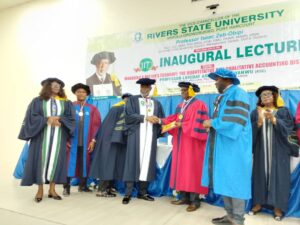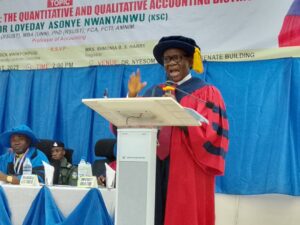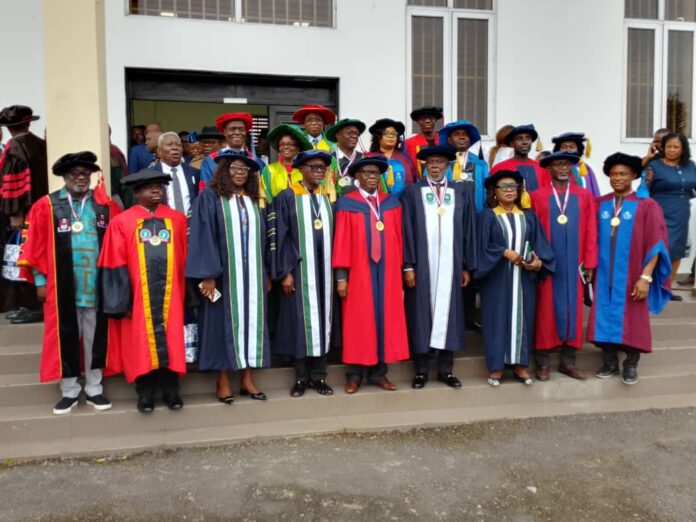A lecturer in the Rivers State University, Port Harcourt, Professor Loveday Asonye Nwanyanwu, has identified reasons why Nigeria’s economy has failed to show remarkable improvement in the last eleven years. This is in spite of policies and programmes initiated and aimed at improving and stabilising the economy.
According to him, some of the policies initiated by various administrations aimed at resuscitating the economy, including the privatisation of over 121 public enterprises between 1988 and 2009, the removal of subsidy on fuel on May 29, 2023 and the floating of the Naira in the Nigerian Foreign Exchange Market by the Central Bank of Nigeria in June 2023, among others have failed to make significant impact on the economy.

Professor Nwanyanwu stated that for the periods 1992-2008, a study of the impact of financial deepening on economic growth, which drew evidence from Nigeria, found that “broad money velocity and market liquidity promote economic growth while money stock diversification, economic volatility and market capitalization do not,” adding that those studies failed to consider “accountant’s ethics” as a major factor for economic growth.
Professor Nwanyanwu, who is of the Department of Accountancy in the Faculty of Administration and Management of the University, made these disclosures while delivering his Inaugural Lecture titled, “Managing A Nation’s Economy: The Quantitative And Qualitative Accounting Distinction,” on Wednesday, August 27, 2025 at the university.
He recognised that for a nation to measure its economic growth, which is through its Gross Domestic Product, that ethical values, a qualitative accounting characteristics must be incorporated as an in-built moderator of human behaviour in the development and implementation of economic policies.
The university Don noted that Accountant’s ethics have the capacity to minimize or eliminate fraud in the environment. He further noted that “an economy devoid of ethics, as seen from the accountant’s perspective of integrity, objectivity, competence, due care and diligence, confidentiality, and professional behaviour aimed at countering negative national value systems of money, ego, power, coercion, ideology, and greed, is an economy devoid of sustainability.”

Prof. Nwanyanwu, whose model for sustainable national economy, states that budgets and other economic statistics are enriched with two inputs: qualitative accounting measures (accountant’s ethics) and qualitative accounting tools and techniques. He said that the application of this model produces economic blueprints that sustain economic growth and economic development because “it considers today, emphasizes tomorrow and focuses on the people.”
According to him, no meaningful economic policy can survive in the absence of accounting ethics, which is also part of human and business ethics. “If those entrusted with the management of our economy lack integrity, honesty, objectivity, transparency, accountability and reputation, economic blueprints will be devoid of relevance, faithfulness, comparability, verifiable, timeliness, and understandabilty,” he stated.
Prof. Nwanyanwu further stated that accountants who maintain and audit the financial statements of all sectors of the economy, including manufacturing, education, banking and other financial institutions, agriculture, health, oil and gas information and technology, real estate, government ministries, departments and agencies, must rise up to resist fraudulent acts from within and without.
This they can do by instituting and implementing internal control systems and state legislation. Specifically, Prof Nwanyanwu noted that the establishment of institutional structures such as external audit, internal audit, and fraud agencies.
Though he acknowledged that the establishment of fraud control agencies like the Economic and Financial Crimes Commission (EFCC), Independent Corrupt Practices and Other Offences Commission (ICPC) Code of Conduct Bureau, Code of Conduct Tribunal, Fiscal Responsibility and Public Procurement Acts were aimed at safeguarding the economy from corrupt officials and enhance good governance, “the weight of the eroded value system makes these machineries look like a mirage.”
He lamented that , though little achievements have been made in the battle against fraud, “the attainment of good corporate governance and elimination of fraud will remain an illusion until the national value system is reversed and integrity, honesty, regard for productivity, knowledge and creativity, love for the nation and fear of public fund is restored.”
According to Prof. Nwanyanwu, for the economy of Nigeria to become sustainable, ethics must play a key role. He further recommended that “people entrusted with managing and implementing the nation’s economic policies should adopt critical realism or triangulation in generating data.
He also recommended that persons to be appointed to positions of governance and authority should be technocrats that possess honesty and integrity. “This is based on the realisation that the Fiscal health of the treasury depends not only on developing an economically sound policy that increased taxable capacity of the economy through economic development but also on honest and efficient financial management,” he said.
Other measures recommended by Prof Nwanyanwu include stoppage of the “dollarization of the economy, which causes inflation, leads to increase in interest rates and devalues the local currency.
He also recommended the establishment of a legislation prohibiting companies from remunerating their employees in foreign currencies, among other recommendations.
Speaking at the end of the lecture, the Vice Chancellor of the University, Professor Isaac Zeb-Obipi commended the lecturer for a painstaking and well delivered lecture.
He said that the issue of ethics in dealing with financial figures is critical while it is important for government officials and leaders in all sectors to re-examine their conducts to ensure that they comply with expectations of the rules of engagements.
By: Celestine Ogolo




